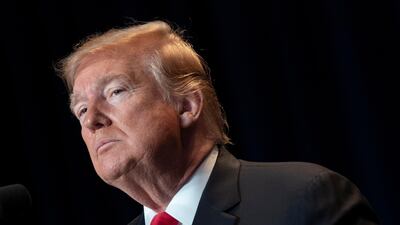US President Donald Trump's declaration that ISIS will lose all its territory in the next week obscures a bigger issue that this doesn't mean the defeat of the group, several experts told The National.
In an address to members of the anti-terror global coalition Mr Trump said on Wednesday that US-led troops and their Kurdish allies had "liberated virtually all of the territory" from the insurgents who once controlled a vast stretch of Syria and Iraq in a self-styled caliphate.
"It should be formally announced sometime next week that we will have 100 per cent of the caliphate," Mr Trump said.
The surprise announcement that US forces are leaving Syria has complicated the situation beyond ensuring that ISIS cannot regain territory. There are ongoing tensions on the ground between Nato-allied Turkey and the Washington-backed Syrian Democratic Forces (SDF) as well as the fate of foreign fighters.
His decision to withdraw US forces from Syria has drawn some criticism at home from Republican and Democratic lawmakers who fear an ISIS resurgence.
But Mr Trump has not backed down from his decision, stating that “we look forward to giving our brave warriors in Syria a warm welcome home,” after ISIS is fully defeated.
"There is literally a square mile of ISIS control left in Syria, it's not too hard to shut them down, the coalition is essentially pounding a small area where ISIS are currently located," Michael Stevens, a research fellow at RUSI told The National.
It’s literally only a matter of time and they are wrapped up, he said.
But there is a central issue with the president’s statement.
“Trump is not wrong in the sense of ISIS losing control of its territory. But in terms of stopping them as an insurgency, they will keep going,” Mr Stevens said.
He pointed out that the terror group has been operating freely in northern Iraq, especially to the south-east of Kirkuk and in the Hamrin mountains.
"The element of defeat depends on barometer one uses. I think if it's about territorial control then it's fair to say they are defeated," Aymenn Al Tamimi, a research fellow at the Middle East Forum told The National.
The danger is not only to see an ISIS resurgence, but also to have such a resurgence coincide with potential conflicts between rival forces, Michael Horowitz the deputy head of intelligence at Le Beck International, a Bahrain-based think tank, told The National.
Despite losing 99.5 per cent of its territory, ISIS has begun making very small territorial grabs in Iraq to show its supporters that it has the ability to offset this loss, the head London think tank, Chatham House Middle East and North Africa Programme, Line Khatib told The National.
“Trump’s announcement is a face-saving measure to justify his comments about US withdrawal in Syria and the so-called defeat of ISIS,” Dr Khatib said, adding that even if ISIS loses all its territory, it will not mean the end of the terror group’s reign.
US Secretary of State Mike Pompeo reassured the coalition partners that the withdrawal of troops from Syria was not “the end of America’s fight.”
He called on them to help permanently defeat ISIS in Syria and Iraq, but how the US maintains pressure once soldiers are back home remains to be seen.

